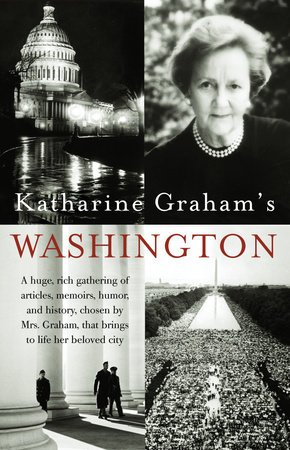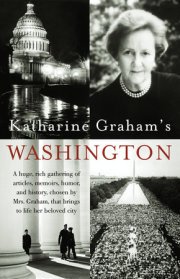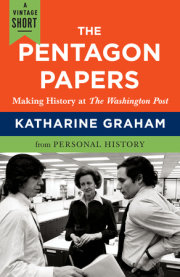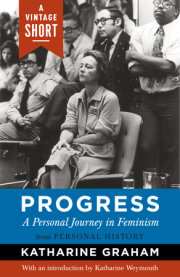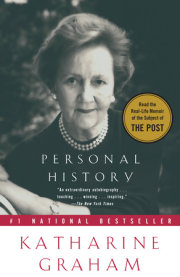Washington Overview
The Washington experience with its bigness and its novelty ends in a deep, grateful happiness.-my mother, Agnes Ernst Meyer, from her diary
Mother was right: Washington is indeed a big experience. This is a place where novelty is nothing new. As Isabel Anderson, a social light here from 1897 to 1919, wrote in her book, Presidents and Pies, "In Washington there is always something new under the sun."
So how does one begin to tackle a topic as big as Washington? My friend Stewart Alsop once wrote that, after years of observing Washington, he "understood why John Gunther had never written Inside Washington, although he at one time firmly intended to do so. There are just too many Washingtons to get inside of."
Clearly, this city cannot be reduced to any single dimension. During the New Deal, FDR, as part of the Federal Writers' Project of the Works Progress Administration, set Americans to work writing guides to great American cities. In the guide to the nation's capital, WPA writers made so bold as to speak of "the fundamental fact about Washington." Their "fact" was that Washington "was created for a definite purpose and has been developed, with many modifications, according to a definite plan. Therein lies its unique distinction among American cities, and among all existing capitals in the western world."
All of my experience relating to this place, however, leads me to the conclusion that there is no one "fundamental fact" about Washington. It's not just one thing-it's one thing and its opposite at the same time. The contradictions inherent in this place are evident everywhere: it's formal and informal; it's public and private; it's social and political; it's a small town and the capital of the world. It's a city that's a symbol of democracy and yet thoroughly undemocratic, since it remains the only place in America where the people are taxed without representation in the very bodies that make the policies that govern them.
In Washington, the public and the private intertwine in such a way that they can't be easily separated. This is the city where the personal and the political are most closely linked. Part of the "bigness" that Mother must have had in mind is that this is a town where principles and passions are writ large. The climate here-by which I mean the feel of the place, its heat in a non-meteorological sense-is just right for people who like drama with all its figurative thunder and lightning.
Washington is certainly the best city in the world for someone like me, who thinks that there just is nothing more exciting than news. To me, involvement with news is absolutely inebriating. It's what makes my life exciting. And even if the news doesn't originate here, it's often commented on here, or enlarged here, or explodes here. Something said in Washington comes boomeranging back in an even bigger way.
Washington is more than a place. It's the best example I can point to of the old English-class concept of personification. People say, "Washington knows this . . . thinks this . . . says that," and everyone seems to know what or who is meant.
Frank Carpenter, a syndicated writer and correspondent for the Cleveland Leader in Washington in the late 1800s, called this city a "living curiosity, made up of the strangest and most incongruous elements." Henry James called it the "City of Conversation, pure and simple, and positively of the only specimen, of any such intensity, in the world." Others have variously referred to Washington as "Democracy's home town," the "city of magnificent distances," and "at once the most and the least American city in America."
For the most part, the people whose writings are represented here offer personal impressions and opinions. They are not historians or authorities, any more than I am, but they all touch on some of what endures.
Alice Roosevelt Longworth, the daughter of Teddy Roosevelt and the wife of House Speaker Nicholas Longworth, once wrote about Washington: "Anyway, it is always an entertaining spectacle . . . the show is there for us, and we might as well get what entertainment we may out of it." I certainly have, and most Washington watchers, including the following writers, have, too.
Edward G. Lowry
The Washington Scene
Washington Close-Ups (1921)
I don't know much about Edward Lowry except that he was a friend of my parents. Mother first met Mrs. Lowry at the home of Mrs. Mark Sullivan in November 1921, shortly after his book was published-a book that, at the time of its appearance, created a lot of buzz in Washington. Mother considered Mr. Lowry "very clever" and described him in her diary as "one of the oldest of the Washington newspaper crowd."Over the next decade or so, Lowry and his wife, Elizabeth, were often guests at our house-both in Washington and in Mount Kisco. In a guest book that my parents kept for a few years, Lowry wrote a little ditty on July 14, 1923: "Rest little booklet rest, bearing this honored name, And may we hear when I come back, 'I'm glad that he has came.' "What he did in the chapters of Washington Close-Ups,
several of which appeared in magazines and journals of the time, including The New Republic, Collier's Weekly,
and the Weekly Review
, was-in Walter Lippmann's words-to "shine the light" on twenty-six of Washington's best and brightest men of that era, and some of the less than best. While his writing is old-fashioned, the portraits he paints of these long-gone (and, in some cases, long-forgotten) public figures are vivid and incisive. No doubt, many were controversial at the time of publication. The chapter on then vice president Coolidge, for example, is titled "Coolidge: Foster-Child of Silence," and within the first two paragraphs, Lowry describes the VP as "a politician who does not, who will not, who seemingly cannot talk," and says of him, "It appears from the meager record that he thinks of himself as Peter Pan, the boy who never grew up to be a man."This selection from Washington Close-Ups
introduces the Washington scene within which all these public figures made their mark.Aeons upon aeons agone, when the bat-winged pterodactyl swooped down relentlessly upon its prey,-I mean to say a long time ago,-this humid cup in the hills that is now the Washington scene may have been different; it must have been. With that we have no present concern.
But Washington itself; the Washington of the organic act, of the Adamses, John and Quincy, of Martin Van Buren, Millard Fillmore, Rutherford B. Hayes, Benjamin Harrison, William H. Taft, and Woodrow Wilson, is the Washington of Warren G. Harding. Regard the eternal changelessness of the two stone legs of King Ozymandias in the desert of Egypt and attune your mind to the tale I have to tell.
Come with me into Mr. Harding's front yard and let us sit under a flowering magnolia and leisurely, as becomes the pure in heart and detached in mind, talk about the familiar apparitions who inhabit these pleasant walks and tinker with our destiny.
It passes belief how little is known about Washington by the country at large, and yet no city is more written about. Still, it is hardly ever justly appraised by the people at home. They seem to see it through a refracting and magnifying haze. New York and Chicago and San Francisco and St. Louis and New Orleans they know and can justly estimate. They are visualized clearly, but it is curiously true that almost every newcomer to Washington and every visitor suffers a sort of stage fright.
O. Henry in one of his stories tells about a cowboy going to New York and being diffident before New Yorkers, until he discovered they were people "just like Grover Cleveland and Geronimo and the Watson boys." No citizen of Danville, Illinois, or Pike County, Missouri, or Springfield, Massachusetts, would make any average American tongue-tied or step on his feet with embarrassment. Yet those three places have furnished the last three Speakers of the House of Representatives, and the Speaker of the House is a great personage in Washington. Tourists to the Capitol peer into his room with awe, and nudge one another furtively and say, "That's him," when they pass him by happy chance in a corridor. Then they go home and talk about it for days and days.
I do not know why it is that individually the Senators and Representatives and Cabinet members are always so awe-inspiring to their fellow countrymen, while collectively it has always been the fashion to disparage them. The late Henry Adams was the very greatest of Washington correspondents, though I should have been afraid so to describe him in his presence. He spent a lifetime, from Lincoln's administration through Roosevelt's, looking at the Washington scene with clear eyes and interpreting the marionettes with the coolest, most detached mind that has ever been brought to that occupation. When I used to talk with him in the latter years of his life I found to my dismay that all of my slowly acquired discoveries he had known since the sixties, and some of them were known to his grandfather before him. Some of his impressions gathered between 1840 and 1869 might have been written to-day looking at the present assemblage here.
It is as true now as it was in President Taylor's administration that Senators are a distinct species, and that continuous service in Congress produces-a Congressman. They have their own easily discernible vocational stigmata. They are a distinct sort of human being and as easily distinguishable, once you know them, as a raw oyster from a cup of tea. The type reproduces with astonishing fidelity, despite the greatest moral, social, and political convulsions.
Our system is so arranged that Congressmen must necessarily spend two thirds of their time making arrangements to endeavor to ensure their reelection. I do not make any outcry against the system, but it is a thing to be pointed out. Six thousand night telegrams properly distributed will agitate Congress like a strong wind blowing over wheat, so sensitive is it to the possible political effect of anything it may do or leave undone.
I remember that President Wilson, who never got on with Washington easily, never fitted into the scene, and, to me, always seemed rather afraid of its allure and subtle charm, once said:
The city of Washington is in some respects self-contained, and it is easy there to forget what the rest of the United States is thinking about. I count it a fortunate circumstance that almost all the windows of the White House and its offices open upon unoccupied spaces that stretch to the banks of the Potomac and then out into Virginia and on to the heavens themselves, and that as I sit there I can constantly forget Washington and remember the United States. Not that I would intimate that all of the United States lies south of Washington, but there is a serious thing back of my thought. If you think too much about being reelected, it is very difficult to be worth reelecting. You are so apt to forget that the comparatively small number of persons, numerous as they seem to be when they swarm, who come to Washington to ask for things, do not constitute an important proportion of the population of the country, that it is constantly necessary to come away from Washington and renew one's contacts with the people who do not swarm there, who do not ask for anything, but who do trust you without their personal counsel to do your duty. Unless a man gets these contacts he grows weaker and weaker. He needs them as Hercules needed the touch of mother earth. If you lifted him up too high or he lifts himself too high, he loses the contact and therefore loses the inspiration.
Washington cries aloud to be written about in an intimate, amusing way. It is somehow different from other social settlements on the broad expanse of our continent. The town has a distinctive social life of its own with a flavor and quality slightly tinctured with the modes and manners of "abroad." It has, too, a seductive charm and glamour all its own. The oddity and part of the charm of the Washington condition is just this, that while it has the social framework of a world capital the chief official personages who people the scene are villagers with a villager's outlook and a villager's background. This makes for unexpected ellipses and provides conversation. Henry James called Washington the "City of Conversation": "Washington talks about herself, and about almost nothing else: falling superficially, indeed, on that ground, but into line with the other Capitals. . . . It is in positive quest of an identity of some sort, much rather-an identity other than merely functional and technical-that Washington goes forth, encumbered with no ideal of avoidance or escape: it is about herself as the City of Conversation precisely that she incessantly converses; adorning the topic, moreover, with endless ingenuity and humor. But that, absolutely, remains the case; which thus becomes one of the most thorough, even if probably one of the most natural and of the happiest, cases of collective self-consciousness that one knows."
I couldn't refrain from quoting that bit of rich and experienced condensation and observation because it is precisely the whole story. People take such dreadful risks when they venture to approach or touch a subject that a master has laid a benevolent and passing hand upon, even if ever so lightly and in passing. Henry James stopped with Henry Adams when he was last in Washington. These two are the only men who have ever written about this national capital with a sureness and skill that illumined and interpreted their subject. Many others have been conscious, but, as it proved, vaguely and dimly, of the scene they have sought to portray.It all comes down to this: Washington is a curious and delightful place; it is so full of the most refreshing and striking contrasts. The capital of a country of a hundred million, and the center of statesmanship, diplomacy, and high politics, its citizens write hot and hasty letters to the powers that be, protesting that hawks devour their Pekin ducks, and that rabbits come after their corn. They argue gravely the constitutionality of their right of defense against these depredations.
Washington is the most feminine of all cities. It has grace and loveliness and many wanton wiles, and, above all, that elusive quality and attribute that for want of a better name we call charm. Its seductiveness and glamour have drawn many a good, homespun citizen away from the hay, grain, and feed business, where be belonged, into the political morass of office-holders. It has the same effect on small-town people that Cleopatra had on Anthony; it makes them forget their homefolks and have dreams which do not come true.
Copyright © 2002 by Katharine Graham. All rights reserved. No part of this excerpt may be reproduced or reprinted without permission in writing from the publisher.

